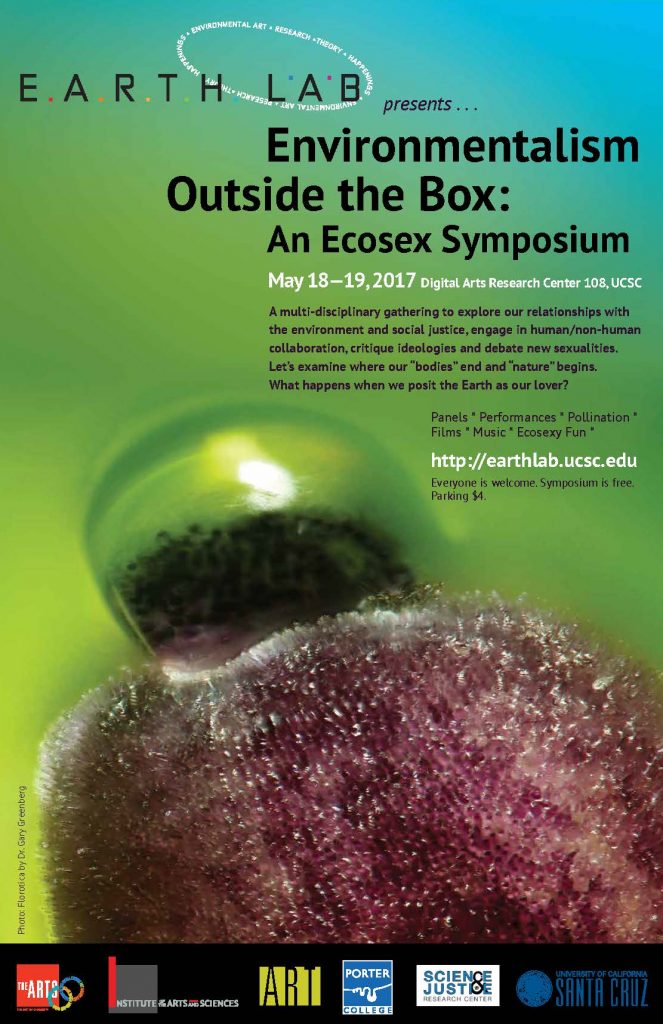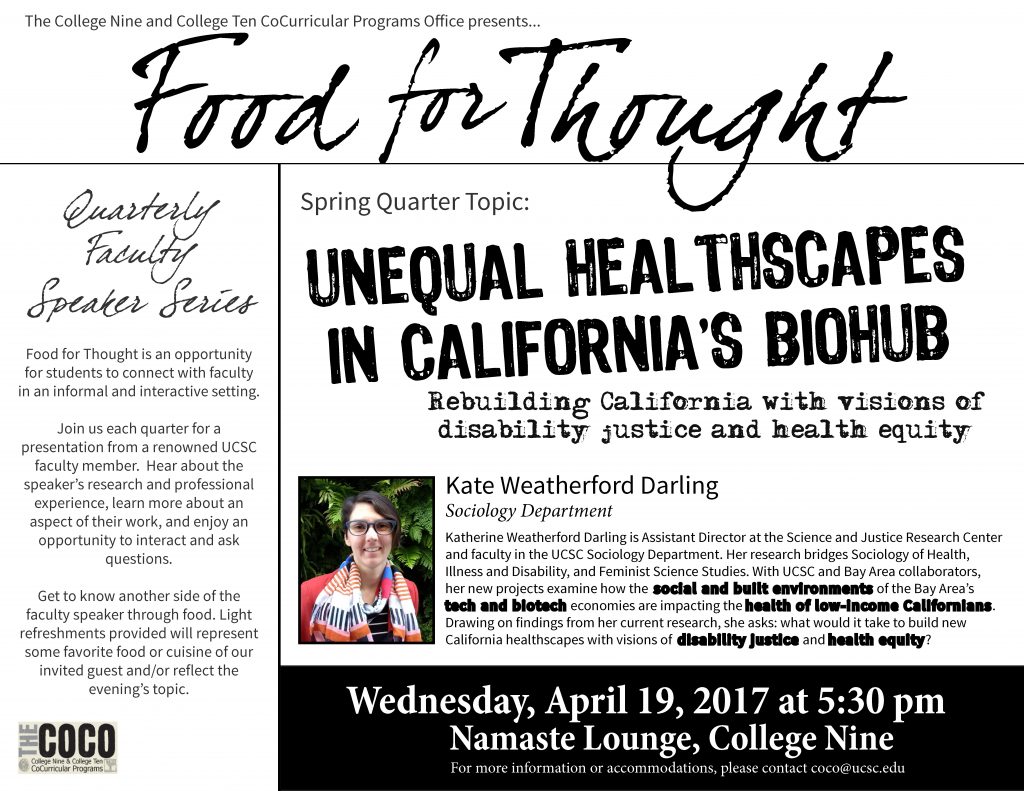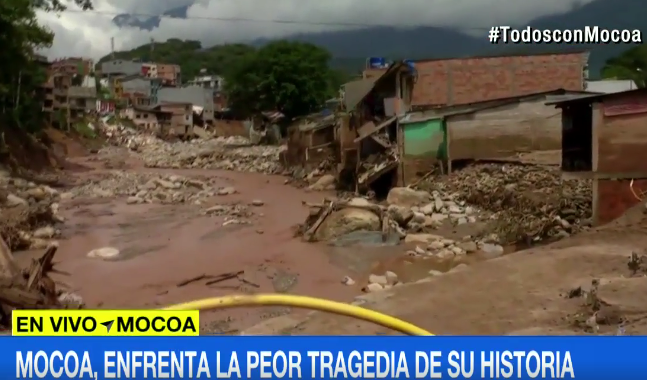"Seeing Like a Valley"
SJWG Rapporteur Report
26 April 2017
Rapporteur report by Shun-Nan Chiang
The event was held in Room 599 of Engineering 2. Around 4 pm, there were around 20 people in the room. Some participants came to the event together or knew each other before the event. There were already some chats before the event began.
Jenny opened the event. She introduced what the Science and Justice Center does and cares about as well as the uniqueness of the center. Then she moved to the introduction of the event about “Silicon Valley.” She mentioned that It is an experimental event. She proposed several intriguing questions about “living with/next to Silicon Valley” and “who” is seen as important or who belongs to the Valley.
After the introduction, as the tradition of S&J event, Jenny invited everyone to go around and introduce themselves. Several people were new to the S&J event or even from outside the campus. Some came particularly for the event. The issue of the Valley and the title of “See in the Valley” may successfully attract some new participants. During the introduction, several people followed Jenny’s opening introduction and expressed what they have thought of or their relevant experience about Silicon Valley.
Then Jenny introduced Joe and briefly mentioned how they began this project. And then Joe gave a full background of the project. He mentioned that the idea of this project is inspired by James Scott’s “Seeing Like a State.” From my impression at that time, many people in that room did not know who James Scott is so may not be able to relate to the idea immediately. Joe then explained the original idea of Scott’s book and pointed out the analogy/connection -- from tunnel vision of the state to the valley vision of companies. Then Joes continued to ask what moral visions of Silicon Valley are and tried to unpack the idea of “morality.” Then Joe introduced his vision about how technology is organized by material culture and talked about the idea of “solutionism.” He mentioned the example of Juicero, a new agrifood tech. Many people in the room knew the case and laughed. Finally, Joe briefly discussed the idea of “Seeing the Valley” and the plan for future projects, including a series of panel discussions about moral visions. During Joe’s introduction, the room was actually quite quiet. My own impression at that time is that I was trying to follow the ideas Joe was articulating and developing.
After Joe’s introduction of the idea of “seeing like a valley,” cultural historian Fred Turner is the first panelist who gave his vision of the Valley. He said “I see the legacy of American puritanism.” Then he emphasizes the idea of “Actual Valley” and introduced projects he has worked on to make visible the invisible part of the Valley. He thought there will be many connections between this S&J project and his work.
The second panelist is Katherine Isbister. She is a professor in Computational Media and introduced herself as a post-hippie. She shared her experience that the Valley has changed from a more idealistic and communal vision to the Valley today that she felt increasingly alienated from. She also mentioned the utopian vision of the Valley and the question how to better train future engineers. When I was listening to her sharing, I was surprised of phrases she used and concepts she articulated because she didn’t seem to be a typical computer scientist to me but more like a social science or humanities scholar.
The third panelist is Morgan Ames. She introduced her project about “One laptop left behind” and also made some allusion to "no laptop left behind.” Then she introduced her current project in marginalized communities in the Valley. As she positioned her research, she focused the communities that are "made marginal" and "proximate peripheries."
After Morgan’s sharing, there were some discussions about potential themes for this project, especially children. Jenny proposed to begin to put ideas on the big whiteboard in the back of the conference room. Melissa De Witte from Social Science Division volunteered to write ideas on the board.
After that, because the fourth panelist went out to pick up a phone call, and it was also around 5 o’clock, Jenny made the decision to have a break. Everyone then went out to have some refreshments. And there were also lots of discussions during the break, just like other S&J events.
It was around 5:20 when everyone returned to the conference room and began the second half of the event. More 5 participants had left during the break. Then the four panelist Michael Mateas shared his vision of the Silicon Valley. He thought there was a genuine utopianism that hoped to change the world for good in the past. As the chair of the Computational Media Department, he also mentioned since they will definitely be present in the Silicon Valley, he was wondering how that could be a transformative platform and how to actually intervene from inside?
Then the discussion opened up to all participants. Almost all participants share their thoughts, experience, or visions. Eventually the entire whiteboard was written with different ideas. Melissa did a good job organizing and sorting out thoughts when writing them on the board.
As the photos of the whiteboard show, participants have proposed many ideas from different angles. “Children” is a topic being brought up several times. Participants seem to think that the issue of children has a clear connection with the idea of morality.
Another important question that was touched several times is who the audience this project hope to speak to. Jenny mentioned many of those tech company owners do have good intentions and hope to contribute in some way. Thus, she asked do we want to reach out to them? From their experience, other participants also mentioned that these company owners will be interested in knowing new perspectives and ideas. Fred mentioned the Salon project he worked on. Other participants also proposed similar events that could bring different visions and different groups of people into discussion. Some participants then mention to bring in other marginalized or invisible groups of people also living in the Valley.
Spatial aspect is another focus. This indicates not only spatial relations within the Valley but also relationships of the Valley to other parts of the world. As some participants ask: “Where is Valley?” Some participants also mentioned the public transportation and google bus in the Valley.
Towards the end of the event, Chris Benner from ENVS/Sociology raised some interesting questions from a different angle. He mentioned that his first book is about the laborers in the Silicon Valley. Then he shared some statistics to show who lives in Silicon Valley. 34% of residents in the Valley are foreign born, many of them are latinos. He suggested that we should also try to invite some of the groups which work on the Valley to join the discussion. Joe and Jenny mentioned that some activists or activism groups working in the Valley were invited to attend the event but didn’t manage to make it.
At this point, I realized that except for few international scholars and students, it seems other U.S. participants are all white.
Margo from Harvard proposed that “Seeing like” and “Valley” are already good topics for future events.
Before the event ended, Jenny and Joe raised the question about how this project could move forwards and what may be a format to communicate with each other. Then all the participants agreed to have a extra mark in the sign-up sheet if they are willing to follow up the project. The event ended around 10 minutes after 6 o’clock.




